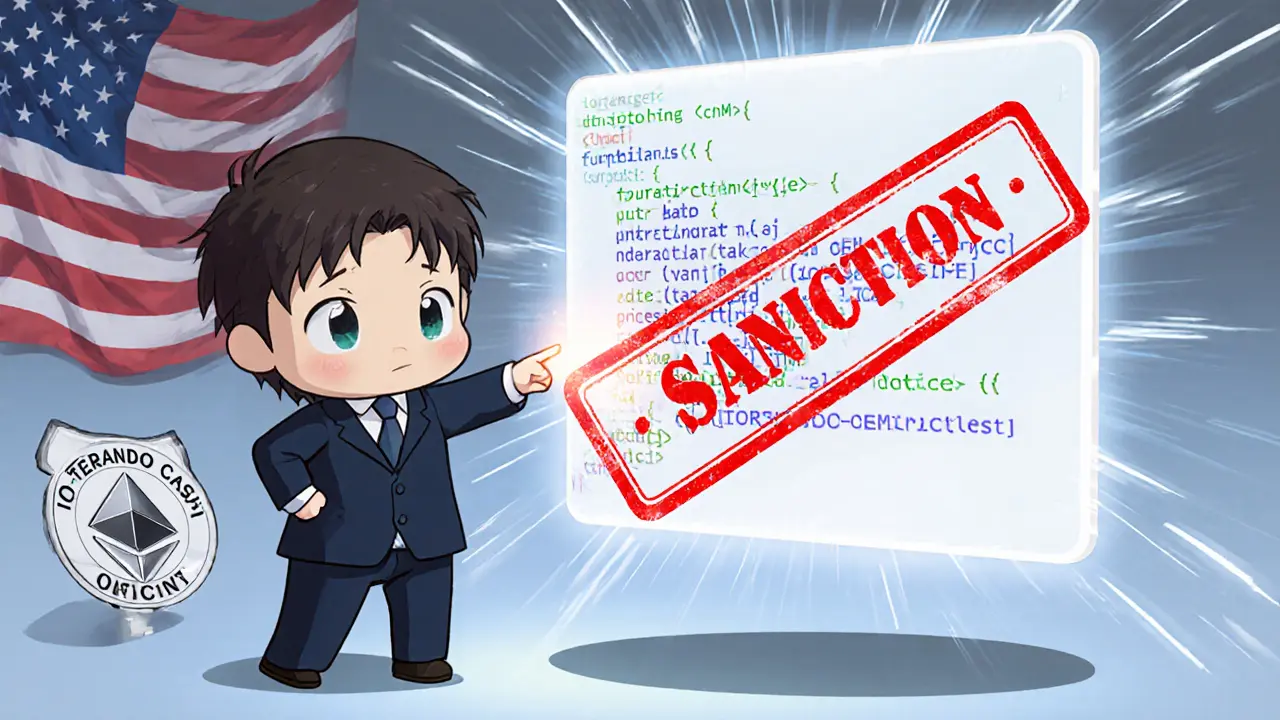Tornado Cash Sanctions Impact Calculator
Quick Take
- US sanctions targeted the open‑source Tornado Cash an Ethereum‑based mixing protocol that hides transaction history in August 2022.
- The move was the first time the U.S. Treasury sanctioned immutable smart‑contract code, not a person or company.
- Key violations cited: laundering over $7billion, including funds from North Korea’s Lazarus Group.
- Legal fights continue: a mixed jury verdict in 2025 and ongoing civil challenges.
- The case reshapes how regulators treat privacy‑enhancing tools in DeFi and forces developers to reconsider liability.
Background: What Is Tornado Cash?
Launched in 2019, Tornado Cash is a non‑custodial, decentralized mixer built on the Ethereum blockchain. It lets users deposit ETH (or ERC‑20 tokens) into a pool, then withdraw the same amount to a new address, effectively breaking the on‑chain link between sender and receiver. Because the protocol is open‑source, anyone can inspect the code, fork it, or run their own instance, but the original smart contracts remain public and unchangeable.
The platform’s native governance token, TORN an ERC‑20 token used to vote on protocol upgrades, has seen wild price swings tied to regulatory news-rising from about $8 to $15 after sanctions were briefly lifted in March2025.
How Tornado Cash Works: The Technical Architecture
At its core, Tornado Cash relies on zero‑knowledge proofs cryptographic proofs that verify a transaction without revealing the underlying data. A user deposits ETH into a smart contract; the contract records a commitment (a cryptographic hash). When the user later wants to withdraw, they generate a zero‑knowledge proof that they own a commitment in the contract without revealing which one. The contract then releases the funds to the withdrawal address.
Key components:
- Ethereum - the underlying public ledger that stores the immutable contracts.
- Relayers - off‑chain services that submit withdrawal transactions on behalf of users, masking the IP address of the withdrawer.
- Denomination pools - predefined sizes (0.1,1,10,100ETH) that ensure anonymity sets are large enough to hide individual flows.
Because the protocol never asks for personal data, there is no KYC requirement, making it attractive for privacy‑focused users and, unfortunately, illicit actors.
Why the United States Sanctioned It
The U.S. Treasury’s Office of Foreign Assets Control (OFAC) the agency that administers and enforces economic sanctions placed Tornado Cash on the Specially Designated Nationals (SDN) list on August82022. The sanctions were issued under Executive Order13694 an order targeting cryptocurrency transactions that facilitate the proliferation of weapons of mass destruction, as amended to cover money‑laundering activities.
OFAC’s justification focused on several high‑profile laundering incidents:
- More than $455million linked to North Korea’s state‑sponsored Lazarus Group a hacking organization indicted for multiple crypto thefts.
- $96million from the June242022 Harmony Bridge hack.
- $7.8million from the August22022 Nomad bridge exploit.
OFAC argued that Tornado Cash “failed to impose effective controls” and thus became a conduit for sanctioned actors. The designation prohibited all U.S. persons from interacting with the mixer’s smart contracts, froze any Tornado‑Cash‑related assets under U.S. jurisdiction, and required financial institutions to screen for the platform’s addresses.

Legal Battles and Court Outcomes
After the sanctions, Tornado Cash’s developers and investors launched a series of legal challenges. The core argument: OFAC overstepped its authority by sanctioning immutable code, which has no legal personhood and cannot be “controlled” in the traditional sense.
Key milestones:
- 2023‑2024: Multiple lawsuits filed in the U.S. Court of Appeals, invoking the Administrative Procedure Act and First‑Amendment claims.
- March212025: OFAC announced a limited easing of the sanctions, allowing certain non‑U.S. transactions, which caused TORN’s price to surge.
- August62025: A federal jury in the Southern District of New York convicted co‑founder Roman Storm the alleged creator of Tornado Cash’s original smart contracts of one count-conspiracy to operate an unlicensed money‑transmitting business-while deadlocking on money‑laundering and sanctions‑violation charges.
The mixed verdict underscores the unsettled legal terrain: developers can face liability for facilitating illicit activity, yet the punishment hinges on whether the law can treat code as a “person” to be sanctioned.
Impact on Users, Developers, and the Market
For ordinary users, the sanctions introduced a compliance nightmare. U.S.‑based exchanges began flagging any address linked to Tornado Cash, and wallet providers added warnings. Ignorant users risked civil penalties or criminal prosecution for merely transacting with a black‑listed address.
Developers of privacy‑preserving projects felt a chilling effect. The precedent suggests that any open‑source tool capable of obscuring transaction trails could be targeted, regardless of intent. Some teams responded by adding optional compliance hooks-e.g., “whitelisting” known law‑enforcement addresses-while others shifted to jurisdictions with looser AML regimes.
From a market perspective, the case sparked a surge in alternative mixers that claim to be “regulation‑resistant.” Protocols like Aztec and Railgun began integrating on‑chain audit logs that can be toggled off, arguing that selective transparency satisfies regulators without sacrificing privacy.
Despite the crackdown, analytics show that the total volume routed through Tornado Cash’s contracts dipped only marginally after the sanctions. Bad actors continue to exploit the immutable contracts, simply using VPNs and obfuscation layers to evade detection.
Future Outlook for Crypto Mixers
The Tornado Cash saga is likely to shape three major trends:
- Regulatory clarification: Expect new guidance from the Financial Action Task Force (FATF) and U.S. Treasury on what constitutes “acceptable” privacy tools versus illicit mixers.
- Technical innovation: Developers may embed “compliance modes” that can be activated under legal order while preserving optional anonymity.
- Cross‑border jurisdictional battles: Nations with strong privacy protections (e.g., Switzerland, Singapore) may become havens for mixer development, prompting diplomatic disputes over sanction enforcement.
For investors, the key is to monitor regulatory signals and focus on projects that demonstrate a clear governance structure and the ability to respond to legal requests without compromising core privacy guarantees.
Key Takeaways
- The U.S. sanctioned US sanctions on a piece of code, marking an unprecedented regulatory move.
- Legal challenges are ongoing; outcomes will define developer liability for open‑source finance tools.
- Users must stay vigilant about compliance, especially when interacting with any DeFi protocol that offers anonymity.
- The broader DeFi ecosystem is evolving toward “privacy with compliance”, a balance that will likely dominate the next wave of innovation.
Frequently Asked Questions
What exactly did OFAC sanction about Tornado Cash?
OFAC added the Tornado Cash smart‑contract addresses and the TORN token to the SDN list, prohibiting U.S. persons from sending, receiving, or otherwise dealing with those blockchain assets.
Can I still use Tornado Cash if I’m outside the United States?
The sanctions technically apply to any transaction that passes through the U.S. financial system. Non‑U.S. users can interact with the contracts, but they risk secondary enforcement if they later engage with U.S. services.
Why was the sanction on code considered legal?
The Treasury argued that the code enables“significant illicit activity” and therefore falls under Executive Order13694, which empowers OFAC to target “any person” facilitating prohibited transactions, even if that person is a digital asset service.
What was the outcome of the criminal trial against the founder?
Co‑founder Roman Storm was convicted of one count-conspiracy to run an unlicensed money‑transmitting business-but the jury could not agree on the money‑laundering and sanctions charges.
How does the Tornado Cash case affect other DeFi projects?
It signals that regulators may target any protocol that can be used to hide illicit funds, prompting projects to consider built‑in compliance options or to relocate development to more permissive jurisdictions.







Mark Camden
November 24, 2024 AT 16:49The United States’ decision to sanction Tornado Cash represents a watershed moment in the governance of decentralized finance, one that cannot be understated. By targeting immutable smart‑contract code, regulators have crossed a line that blurs the distinction between software and legal entities. This sets a precedent that any open‑source project facilitating anonymity may be subject to the same punitive measures, regardless of the intentions of its developers. The moral calculus is clear: privacy tools that can be leveraged for illicit activity are not exempt from societal responsibilities. It is incumbent upon the cryptographic community to recognize that freedom of code does not equate to freedom from accountability. The sanctions underscore the principle that technology exists within a social contract, and when that contract is breached, enforcement follows. Moreover, the Treasury’s reliance on Executive Order 13694 reveals an expanding interpretation of what constitutes “person” under sanctions law. This legal evolution threatens to stifle innovation, as developers may shy away from building robust privacy solutions out of fear of future blacklisting. The mixed jury verdict in 2025 further illustrates the judiciary’s ambivalence, yet it undeniably leans toward a stance that code can be culpable. Such outcomes jeopardize the ethos of decentralization that underpins blockchain’s promise. Practitioners must now weigh the ethical implications of creating tools that obscure transaction trails. The emergence of “compliance modes” in newer mixers is a direct response to this regulatory pressure. While some argue that this compromises the very nature of privacy, it is a pragmatic adaptation to an unforgiving legal environment. In the long term, the market will likely fragment, with privacy‑focused projects migrating to jurisdictions that are more protective of cryptographic freedoms. Investors should monitor the evolving guidance from bodies like FATF, as it will shape the risk landscape for any anonymity‑oriented protocol. Ultimately, the Tornado Cash case is a cautionary tale that the pursuit of unfettered privacy must be balanced against the broader societal imperative to prevent money laundering and financing of terrorism. Failure to acknowledge this balance will invite further sanctions and legal challenges that could cripple the nascent DeFi sector.
Evie View
November 30, 2024 AT 11:43Honestly, this whole sanction thing is just a massive overreach, and it makes me furious! The authorities are trying to choke off privacy under the guise of security, but they’re only punishing legitimate users who value anonymity. It feels like an attack on personal freedom, and it’s infuriating how quickly they label an entire technology as evil without nuance.
Jayne McCann
December 6, 2024 AT 06:36I think it’s a bit overblown. Sure, mixers can be used badly, but they also help regular folks protect their financial privacy. The sanctions might just push the tech underground, making it harder to monitor bad actors.
Richard Herman
December 12, 2024 AT 01:29It’s a tricky balance. Regulators want to stop money‑laundering, yet privacy is a core tenet of many crypto users. Perhaps a middle ground, like optional compliance hooks, could satisfy both sides without stifling innovation.
Parker Dixon
December 17, 2024 AT 20:23Exactly! Adding compliance options that can be toggled on request could keep developers safe while preserving user privacy. 😊
At the same time, education is key – users should understand the risks of interacting with sanctioned addresses. A collaborative approach between devs and regulators might lead to smarter solutions.
Stefano Benny
December 23, 2024 AT 15:16Look, the tech is just a tool. If you label the code itself as criminal, you’re conflating the instrument with intent. This is classic regulatory overreach, and it will only drive innovation to jurisdictions with looser AML regimes. 🚀
Bobby Ferew
December 29, 2024 AT 10:09Sure, but the reality is that bad actors will always find ways to hide. With the sanctions, we might see an escalation in sophisticated obfuscation techniques, making traceability even harder. It’s a cat‑and‑mouse game, and the regulators are just trying to keep up.
celester Johnson
January 4, 2025 AT 05:03One could argue that sanctioning code is a metaphysical paradox – a non‑sentient entity being judged as a moral agent. Yet, in practice, the impact is tangible: users face legal danger, and developers confront existential risk. This opens a philosophical debate on whether code can possess agency.
John Kinh
January 9, 2025 AT 23:56Sure, why not?
Sidharth Praveen
January 15, 2025 AT 18:49Let’s stay positive – this challenge can spark creative solutions! Developers can experiment with hybrid models that give users control over privacy while offering audit trails when legally required. Optimism drives progress, even in tough regulatory climates.
Sophie Sturdevant
January 21, 2025 AT 13:43Optimism is fine, but we need to be aggressive in building compliance layers that meet global standards. Without a strong, enforceable framework, these mixers will keep attracting illicit use, and that’s unacceptable.
Nathan Blades
January 27, 2025 AT 08:36From a philosophical standpoint, the tension between anonymity and accountability mirrors the age‑old debate of liberty versus security. The current wave of regulation forces us to re‑examine the ethical foundations of decentralized finance. Perhaps the answer lies in designing protocols that embody both transparency and privacy, offering dynamic consent mechanisms. By embedding ethical decision‑making into the code, we can align technological possibilities with societal values. This could be the next evolution of DeFi, where moral considerations are not an afterthought but a core component.
Somesh Nikam
February 2, 2025 AT 03:29Great insights! 🎉 Maintaining precise documentation and clear user guidelines will help navigate the regulatory maze. Coupling that with empathetic community support can ensure users stay informed and compliant without feeling alienated.